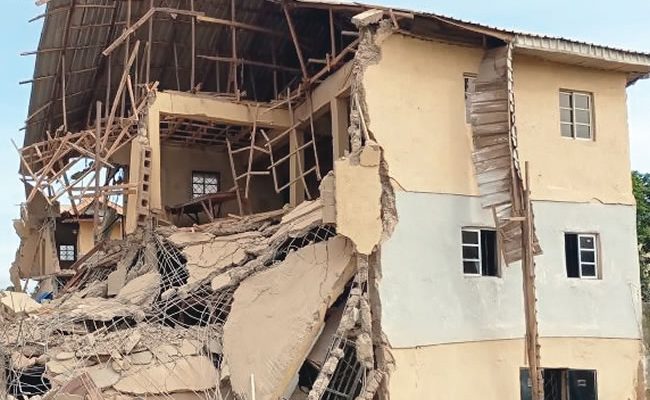
Insurance provides financial protection against unforeseen disasters, enabling swift recovery, reconstruction, and restoration of critical services. Stakeholders must create more awareness on the need for compliance with code of public building insurance and insurance of buildings under construction, writes JOSEPH INOKOTONG.
Many buildings have collapsed in the country before now, and if adequate measures are not instituted, there is no guarantee that more will not cave in. However, the collapse of one-storey building last week Thursday at Yegede-Foworogun, Ibadan, in Ona-Ara Local Government Area of Oyo State has once again, thrown up the need to sensitise the citizens on the need to embrace insurance.

The integrity of the collapsed building notwithstanding, the losses suffered would have been minimized if the owner had taken an insurance policy. Insurance itself does not prevent building from collapsing, but it plays vital roles in the nation’s economic development, serving as risk minimizer. Its principal roles include but not limited to mitigating risks and protecting businesses, individuals, and government assets by supporting infrastructure development through innovative risk transfer solutions.
As the President of the Nigerian Council of Registered Insurance Brokers (NCRIB) Prince BabatundeOguntade highlighted at a recent event, the insurance industry serves as a major source of investible funds in other clime’s economies. It is the bedrock of any economy, and no nation develops beyond its level of insurance appreciation. In fact, insurance owns banks, but this is not the case in Nigeria as the industry is at the backwaters of the various economic considerations by different strata of society.
Last Thursday’s tragedy at Yegede-Foworogun, Ibadan is reported to have claimed the lives of 10 persons while over nine others sustained varying degrees of injury during the incident.
The National Insurance Commission (NAICOM) places a great premium on building insurance, and has been spearheading awareness on insurance for public building, and those under construction. The citizens can safeguard their investments, ensure the continuity of essential services and promote a safer, more resilient environment by insuring public buildings.
Building insurance falls within the compulsory category that is required by law, and it is mandatory to have at least some form of insurance, such as car insurance, public building and building under construction insurance, health insurance, or workers’ compensation insurance.
Compulsory insurance is intended to protect the public interest and to ensure that individuals and businesses are held accountable for any damage or injury they may cause.
However, experts say compulsory insurance has its pros and cons. On one hand, it can help to ensure that people are protected from the financial consequences of accidents or injuries. On the other hand, it can be seen as an infringement on personal freedom and can add an additional financial burden to individuals and businesses.
No matter the perspective one may hold, it is obvious that the potential benefits of compulsory insurance outweigh the costs. For example, in countries with universal healthcare, everyone has access to medical care regardless of their income level and this is only possible because everyone pays into the system through compulsory health insurance. So while compulsory insurance may seem like an inconvenience, it can actually be quite beneficial for society as a whole.
Insurance has solutions for public buildings and buildings under construction. Different types of insurance are used for public buildings and buildings under construction. One common type of insurance is builder’s risk insurance, which covers the property and materials associated with a construction project from the time they are delivered to the site until the project is completed. There is also the cost of construction insurance, which covers a project during the building process and usually includes coverage for the structure, materials and the cost of labour.
In all aspects, stakeholders’ collaboration is key to ensuring compliance with compulsory insurance requirements. Government agencies, insurance companies and the general public all have roles to play in ensuring that compliance is achieved. Government agencies can provide information and education about compulsory insurance and they can enforce compliance through fines or other penalties.
Insurance companies can work with citizens to ensure they understand the coverage they are required to have, and can also help to educate the public about the benefits of compulsory insurance. The general public can play certain roles by following the rules and making ensuring possession of appropriate coverage.
In spite of the enormous benefits of compulsory insurance, a sticky issue of ethical question still persists. People query if it is ethical to compel others to purchase insurance against their will. Ethical implication of compulsory insurance is quite complex. On one hand, it could be argued that it is unfair to force people to buy insurance against their will because it is a violation of personal freedom. Also, there is an argument to be made that it is ethically necessary to require people to have insurance to protect themselves and others from financial hardship in the event of an accident or disaster.
Without mincing words, the benefits of compulsory insurance, like protecting people from financial hardship, outweigh the potential downsides, like infringement on personal freedom, but it is necessary to strike a balance between the two, it should not be an all-or-nothing situation.
Experts say one way to strike a balance might be to provide more choices and flexibility within the compulsory insurance system. For example, people could be given a choice of insurance providers, or they could be allowed to choose the level of coverage they need. This will ensure that people have the protection they need without infringing much on their personal freedom. This can be a good way to strike a balance between the benefits and drawbacks of this system.
The cost of compulsory insurance, and how it should be covered is a contending issue. Opinion varies on whether it should be the responsibility of individuals or it should be funded through taxes. There are a few options for covering the cost of compulsory insurance, especially that of building insurance and building under construction. One option is to make it the responsibility of individuals, by requiring them to purchase insurance policies on their own. Another option is to fund the cost of insurance through taxes, either by increasing general taxes or introducing a special tax for this purpose. The third option is to use a combination of these approaches, with individuals paying some of the costs and the government subsidising the rest.
The desirable is to fashion out the most fair and practical option. This depends on the perspective and values. Some people might believe that it is most fair for individuals to pay for their own insurance since they are the ones who will benefit from it. Others might believe that it is fairer for the cost to be covered through taxes since everyone benefits from having a safe and well-insured society. Some might believe that a combination of the two is the most fair and practical option.
The NAICOM has a firm grasp of compulsory insurance in Nigeria. This is exemplified by its decision to embark on sensitisation programme where stakeholders were informed of the benefits of the exercise. They were educated on the benefits of compulsory insurance – Public Buildings and Buildings under Construction, Third Party Motor Insurance, among others.
The Commission’s ongoing compulsory insurance drive on public buildings and buildings under construction could not have come at a better time due to the alarming rate of building collapses in Nigeria. It underscores the urgent necessity of enforcing the compulsory insurance regulation. These two types of insurance are part of the compulsory insurance policies of the Commission that give succour to people in the event of a building collapse or the occurrence of other risk factors.
The Building Collapse Prevention Guild reported at least 62 catastrophes were recorded in 2022, causing 84 deaths and injuring 113 persons. Lagos had 20 cases, while Kano and Anambra recorded five building accidents each, and Delta and Jigawa had four each. Also, 135 cases were reported between 2007 and 2013. These collapses not only resulted in the loss of invaluable human lives but also led to significant financial burdens for the government and communities.
As a nation, landlords and building owners, project managers and site builders, users and workers within public buildings, all need to start taking these two insurance policies very seriously – the Public Building Insurance and the Insurance of Building under Construction. Insurance provides financial protection against unforeseen disasters, enabling swift recovery, reconstruction, and the restoration of critical services.
By insuring public buildings, Nigeria can safeguard its infrastructure investments, ensure the continuity of essential services, and promote a safer, more resilient environment for the citizens. Stakeholders must fashion out a way forward to drive more awareness and compliance with Public Building Insurance and the Insurance of Buildings under Construction.
READ ALSO: Bode George to Sanwo-Olu: Regulate street trading, don’t treat traders like criminals







